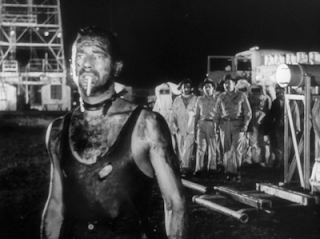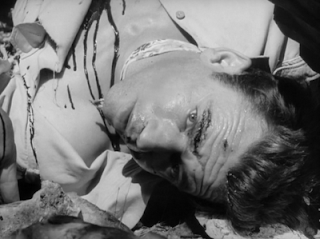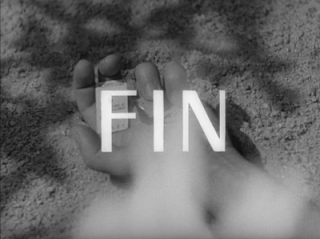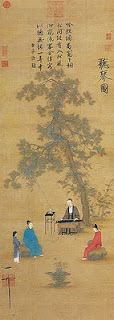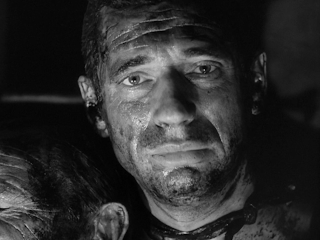 |
| "Le salaire de la peur" |
This is a great film, yet it has a fatal flaw in my view. Mario, played by Yves Montand, and his close friend Jo (Charles Vanel), and others are tasked with transporting nitroglycerin (which is very unstable) to a far off site where it's needed. The plot is simple and straightforward. The richness of the film comes from the poignant drama, the three dimensional characterizations provided by the script and principal actors, the use of cut shots to convey emotional content and the use of symbolic imagery,. I strongly disagree with the Sartresque ending however. Japanese films, which are known for having the protagonist(s) die, have a rich history of self-sacrifice. Bound by a strict social code of honor, their death is given context and a meaning, even if we disagree with it. In this film however, the ending feels heavy handed and reeks of the philosophical influence of atheistic existentialism. In pushing against what they saw as the problems in Idealism they established a system of thought just as arbitrary with its own problems, which I'd contend are far worse. In this nihilistic view life and even our existence is a tragic joke, a pointless exercise where we are certain only of despair and nothingness.
There is no spiritual existence, nor even a sure epistemological foundation to rely on. In this broken ontological state man is destined for destruction without meaning. Mario is finally liberated from his materialist concerns, yet his joy was short lived and he's soon destroyed. Existentialist philosophy girds the script. A much better ending would have been for Mario to get back home and live his life, to have some measure of happiness and love, yet tempered with sorrow at the loss of his friend. But such a hopeful and life affirming conclusion is an affront to the nihilist. Some say Mario was driven to such irresponsible behavior by suicidal impulses, but I think it's clear he was compelled to demonstrate man's ultimate folly. When the truck was stuck in the oil pond Mario disregarded Jo's well being. When asked why he didn't stop Mario says that he had no choice. Also when Jo was near death in the truck and reminiscing about a fence on the street he used to live on, just moments before he dies he asks, "What was beyond the fence?" Mario answers, "Nothing." Then as Jo is literally exhaling his last few breaths his eyes grow wide and full of fear as he exclaims,"Nothing!", then dies immediately. This is akin to waving a giant red flag at us! The nihilistic message implicit in that sad exchange is so obvious. This and other little cues are peppered throughout the film and speak to the running nihilistic narrative.
Mario's exuberant, 4000 francs richer and on the way home to be reunited with Linda, yet I knew exactly what was to come. If one has read mid 20th century nihilist literature, particularly French, this ending was expected. Arnaud and Clouzot wanted this and it lessens the value of their film to a degree. A magnificent film, yet tainted by a dangerous and fatuous philosophy. The entire tortuous journey, the death of his friends, it was all for nothing. They were all destroyed and nothing was gained by it.

